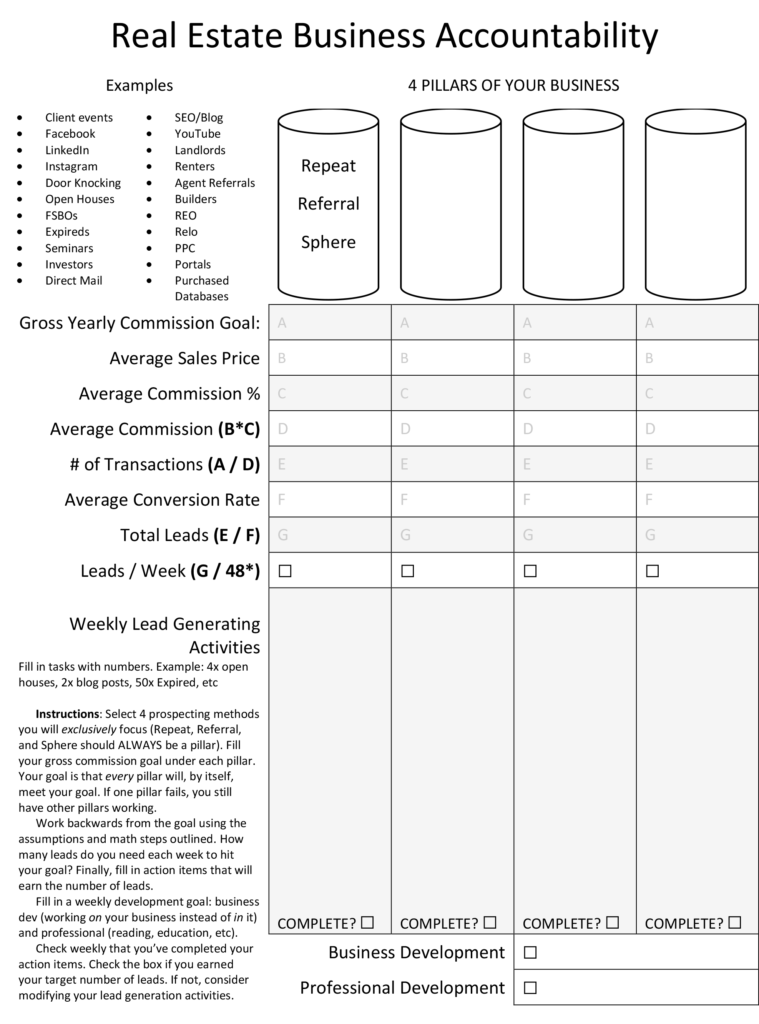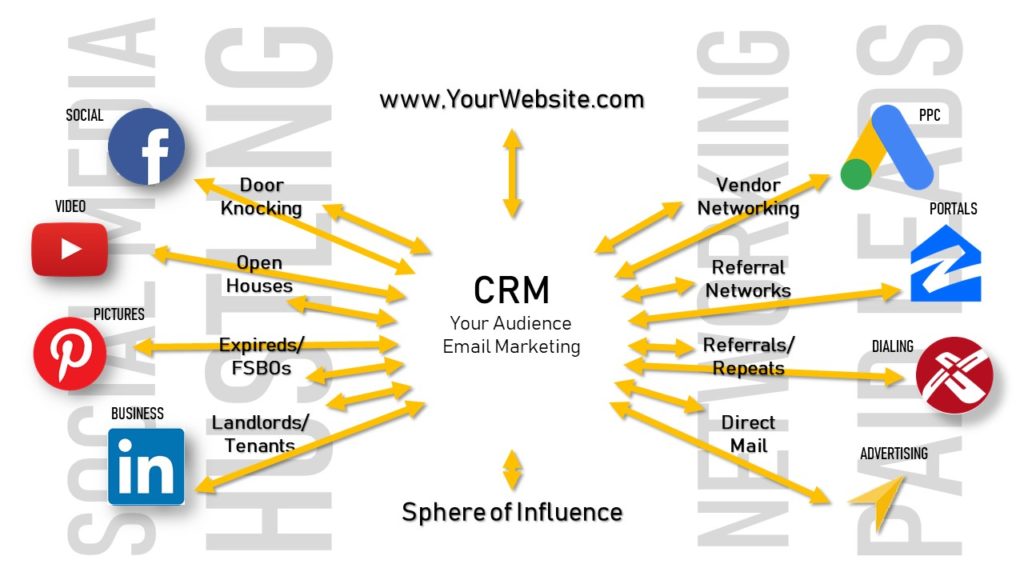How to Set Real Estate Goals with Examples for 2023
As a real estate agent, setting an income goal for a year is nice.
But how do you know if you are on track to achieve it? What do you need to do on a daily, weekly, and monthly basis to enable success?
Is your goal achievable? Are you using the right strategy? Are you wasting time on things that are not helping?
Here are my suggestions on how to think about goal-setting for Realtors and what you can do to keep yourself accountable to success.
Step 1: Start with Why
Obviously, you want to make money!
But making money is a result of creating value. What are you going to do that creates value for customers that they cannot already get? That is your why.
Then, consistent with that why, you can create a business mission. Your mission is the North Star of all your decision-making.
Why are you in this business? Whom are you serving?

Start With Why: How Great Leaders Inspire Everyone to Take Action
Simon Sinek
Business coach Simon Sinek wrote Start With Why, a fantastic book about how successful business leaders begin with their mission.
It may seem like common sense, yet countless businesses fail to inculcate their mission.
The consequence is a decision-making process that is misaligned with company goals, wasted effort, and, ultimately, failure.
Understanding your “why” will ensure you are selecting the best prospecting strategies, are realistic about how achievable your goal is, and are optimizing how you spend your precious time.
The number 1 biggest mistake real estate professionals make is not spending enough time on the highest priorities of their business. Starting with a clear “why” is the first step to avoiding this mistake.
Closely related to your Why is selecting a niche and creating your value proposition.
You cannot be all things to all people. Narrowing your target customer will help separate you from your competition while better serving your Why.
EXAMPLE 1: You are semi-retired looking for some extra income, but still prize freedom and flexibility. You may want to choose a brokerage that has a relocation program. You can more easily turn on or offer your lead generation as your schedule requires. Your business goals will look significantly different, as well. Instead of spending lots of time lead generating, you may be working on your follow-up and customer service.
EXAMPLE 2: You are a former mortgage officer who understands loan origination. Your Why includes ensuring your homebuyers are getting the best deal the market can deliver. You want to lean into your subject matter expertise, which means predominantly selecting strategies that target buyers instead of sellers, like homebuyer seminars or content marketing. Your lead generation strategy includes cultivating relationships with other local lenders who are confident you understand their pain points, earning their referrals.
Step 2: Pick Your Strategy
I’ve written elsewhere about choosing your lead generation strategy.
Now that you have a mission, value proposition, and niche, you want to choose a lead generation strategy that best supports those.
Is your goal to build a team that can build on each other? You might want to cultivate paid leads that are scalable and allow a team to thrive.
Are you an analytical type C on the DISC scale with a mission to deliver the highest ROI to your clients? Strategies targeting investors, landords, or even direct mail yellow letters to homeowners is a great way to grow a business consistent with your mission.
Step 3: Work Backwards from Your Income Goal Within Your Strategy
You have your Why. You have your end state and strategy for getting there.
But now what do you do?
Define your goal and then break your goals into bite-sized, weekly chunks.
For each goal, start with the end state and work backwards to determine what you need to do weekly. Turn your long-term goal into short-term goals.
EXAMPLE: Susan wants to make $200,000 / year with Open Houses as a pillar of her lead generation.
Net Income Goal = $200,000
20% Brokerage Split (200,000 * 1.2) = $240,000
$30,000 Operating Expenses ( 240,000 + 30,000) = $270,000
Average Commission (3% * $300,000 Average Purchase Price) = $9000
Target # Transactions (270,000 / 9000) = 30
Estimated Conversion Rate = 2%
# New Leads / Year (30 / 0.02) = 1500
# New Leads / Week (1500 / 48) = ~32
# Leads / Open House = 12
# Open Houses / week (32 / 12) = ~3
ACTION: Host at least 3 open houses every week.
BOLD are figures Susan determines or estimates
In this example, Susan may be estimating some things to get started, like the average commission, average sale price, and average conversion. But she will want to track these numbers as the year progresses so that she can track if her assumptions are still on pace to achieve her goal.
For example, if open house leads are only converting at 1%, well then she is on track only to hit 50% of her goal! That is a major signal that she either needs to get 64 open house leads per week, or spend time improving her conversion of open house leads to 2%.
This methodology was popularized by Gary Keller in The Millionaire Real Estate Agent.

The Millionaire Real Estate Agent: It’s Not About the Money, It’s About Being the Best You Can Be!
Gary Keller
This foundational book by Gary Keller, founder of Keller Williams, is a must read book for new agents.
In particular, he outlines the process of working backwards from your annual goals, converting them into bite-size weekly goals to which you can hold yourself accountable.
This doesn’t just work with production goals like income and transactions.
If you have a goal like mastering a CRM by the end of a year, you can break out how long you think that will take and then ensure you are spending the appropriate time per week to achieve that end result.
Remember, you aren’t testing your primary goal. Is Susan’s goal of $200,000 net income a reasonable goal? Probably, in many cases, but I can’t tell just based on that!
The real question is “Can Susan do 3 open houses a week?” That is her goal. If she can do that and get 12 leads at each one, she should be well on her way to achieving her big goal of $200,000 net income!
Good Goals
Host at least 3 open houses combining for at least 32 visitors every week.
Publish at least 4 blog posts per week.
Contact at least 20 expired or FSBO sellers by phone per week.
Achieve one new designation per year.
Bad Goals
Implement a full real estate marketing system (not specific, measurable, or timely)
Nurture my database by the end of 2022. (not specific)
Start a website (not relevant, if a website is not integral to your chosen lead generation strategies)
Publish 10 YouTube videos per week (probably not achievable under most conditions)
Goal Setting Template



This template will help you do the math on commission income goals and work it out to weekly tasks.
Step 4: Select SMART Goals
Imagine Susan has a goal to earn $200,000 a year.
Let’s see if that meets the elements of a “SMART” goal.
- Specific. Net Income is a specific and clearly defined goal: it is income minus expenses like brokerage fees and business expenses.
- Measurable. Net Income can be easily measured, especially if using simple software to track business expenses like Realtyzam.
- Achievable. Is $200,000 achievable? Probably, but we don’t know until we break it down into weekly components. Are 3 open houses per week achievable? Yes. A committed agent could probably pull that off in most markets.
- Relevant. Susan has decided she wants to make money serving customers and will use open houses as her primary prospecting method. I’d say $200,000 net income is relevant to that goal.
- Timely. Susan’s goal is in the next 12 months, so there is a clear timeline. More importantly, her individual steps have a clear and short timeline she can hold accountable. She will do three open houses per week. If she fails to do that, she’ll know in a week that she’s off target for her goals, and not figuring that out when it’s too late in the year.
KPIs and OKRs
A measurable goal is one with a KPI or OKR attached.
These are terms often employed in the business world, both describing whatever essential metrics best define progress toward a goal.
- KPI: Key Performance Indicator
- OKR: Objective and Key Result
Make sure every goal has a measurable KPI attached to it.
Usually, this is easy. The goal $200,000 gross commission income (GCI) in a year already has a KPI! It’s GCI!
But some goals seem to defy measurement.
How does one define success in the goal of implementing a complete real estate marketing system?
Well, in this example, a marketing system isn’t a goal. It’s the means. If you are revamping your marketing system, it is because you want to improve another metric. Better follow-up. More leads. Those are your real goals.
So your goal would be, for example, to “improve database conversion from 1.2% to 2% by the end of the year”. Bringing on new software is just the “how”. It’s not the “what”.
Still other goals, like professional development, require your trust in these “soft skills” that are necessary to being a successful businessperson.
And then when it comes to measuring your Why, things can be tricky. What KPI measures “giving back to your community”, or “great customer service”? (Possibly dollars contributed to a charitable cause, or Google business reviews, respectively?)
Relative vs Absolute Goals
It’s fine to pick relative goals. But convert it into an absolute goal.
For example, I want to be in the top 10% of agents by volume by the end of 2022.
The top 10% is relative to other agents and their production, and is always changing.
If this competitive goal motivates you, then great! Just do the work to figure out what that top 10% is and convert it into an absolute goal.
For example, the 90th percentile (top 10%) might be $7M volume/year (you can maybe find this in your MLS?). Assuming an average sales price of $300,000, a conversion rate of 2%, and a 48 week year, your goal should be to achieve and nurture 25 new leads per week. (7,000,000 / 300,000 / 0.02 / 48 = 24.31)
Step 5: Adding Business AND Professional Goals
Most of your goals may be income related, but you should have some professional or even personal goals included as well. Maybe your goal includes work-life balance and making room in your business to spend more time with family!

The E-Myth Real Estate Agent: Why Most Real Estate Businesses Don’t Work and What to Do About It
Michael E Gerber Companies
Michael Gerber’s legendary E-Myth series for small business owners is adapted to the real estate agent!
Gerber’s “E-Myth” refers to the “Entrepreneurial Myth”, the mistaken belief that people who are good at their jobs are also good at running their business.
It’s not enough to be a good Realtor. You need to become a good business person if you want to succeed, which means working not only in your business but on your business.
Example Business Goals. (Working in your business)
- # transactions / year
- total $ GCI / year
- # unique visitors on website / month
- # doors knocked / month
- # hours dialing / week
Example Professional Goals (Working on you and your business)
- Achieve a new designation
- Run for an office in your local association or MLS
- Spend # hours / week practicing scripts
- Become proficient in your CRM
Step 6: Staying Accountable
Keeping yourself accountable to these goals and actually executing on your plan is the hard part.
I shared an accountability checklist above that you can use to stay on track with your weekly real estate goals.
Find colleagues with similar goals within your brokerage or even outside of your brokerage. Diligently put together weekly accountability meeting at Starbucks or over Zoom.
Be selective about who attends, and keep the group small; under ten people.
Ask yourselves these simple questions:
- Did you achieve your goal last week or not?
- If not, why not?
- How are you going to fix it going forward?
If you are missing your goals, you need to make up for it the next week. If you miss your goals in consecutive weeks, you need to start making major changes to your business and day-to-day. No excuses.
Revisit Your Goals
You should be revisiting your goals weekly in accountability meetings. These should give you a good sense of your business progress.
But reviewing your business at a higher level quarterly is advisable as well.
Are open houses a good lead generation source? Do you need to make a major shift on your follow-up? Are you ready to make the jump to a more sophisticated CRM to further support your initial success? Do you need to rejigger your numbers to accommodate a virtual assistant?
Put some business planning on the calendar each quarter.
More Examples of Real Estate Goal Setting
Mark
Situation: Mark is an experienced agent who has had success hustling for leads, but wants more of his lead generation to be from passive, high ROI sources. He decides improving his website with content marketing is a new pillar he wants to add to his business.
Lead Generation Pillar: Blogging and Website
Income Goal: $300,000 GCI / year
Assumptions:
- $400,000 average price point
- 2.5% average commission
- 1:2000 conversion for unique website visitors (0.05% conversion)
- Average blog post earns 200 unique views/month
Math: 300,000 / (400,000 * 0.025) / 0.0005 / 200 / 12 / 4 = 6.25
Goal: Publish 7 blog posts per week.
Other Activities:
- Select 300 SEO keywords.
- Create a content schedule for 300 blog posts in a year.
Rebecca
Situation: Rebecca is a new agent looking to better leverage her social media for her business. She’s a social butterfly and gravitates naturally to social media options and elects to make Facebook a core pillar of her business. (Note: I am going to build my assumptions based on this case study from Agentfire). The $2.98 cost per lead seems pretty good, so I might be more conservative in your figures if doing a similar exercise.
Lead Generation Pillar: Facebook Leads
Income Goal: $100,000 net income / year.
Assumptions:
- 80/20 brokerage split capped at $20,000
- $10,000 business expenses
- $250,000 average home price
- 3% average commission
- $2.98 cost per lead
- 0.5% conversion rate
Math: (100,000 + 20,000 + 10,000) / (250000 * 0.03) / 0.005 * $2.98 / 12 = ~$860
Goal: Spend $860 per month on Facebook advertising, collecting at least 288 leads per month.
Other Activities:
- Create a great Facebook ad template
- Refine follow up workflows
Paul
Situation: Paul has been a successful real estate agent for five years and is ready to start a team. He wants to continue working on his own database for referral and repeat business and give the rest of the leads from other sources to his team. He wants to be sure he is marketing his database effectively enough to hit his personal income goals.
Lead Generation Pillar: Repeat and Referral
Income Goal: $250,000 net income per year.
Assumptions:
- $350,000 average sales price
- $15,000 cap on brokerage split
- $30,000 annual expenses
- 2% average commission (mostly listings)
- 1000 people in his database
- 5% conversion (either repeat business or earning a referral)
Math: (250,000 + 15,000 + 30,000) / (350,000 * .02) / 0.05 = 842.9
Goal: 1000 > 842.9. His database is large enough to sustain $250,000 per year. In fact, we can calculate that each person in his database should be worth ~$296 per year based on these assumptions.
Other Activities:
- Stay top-of-mind with a monthly newsletter
- Contact past customers at least twice a year (40 contacts per week)
- Create a holiday card schedule
- Schedule time to update your database on home values and property tax appeals
The Military Method
My background is in the military, and I often like to look at real estate from an Army perspective.
The military has a lot of practice setting and working toward objectives, which has a lot of applicability to the business world.
So how does the Army set goals?
Below are the relevant components from an Operations Order (OPORD) and descriptions as found in ATTP 5-0.1, Commander and Staff Officer Guide (emphasis mine).
Mission. State the unit’s mission—a short description of the who, what (task), when, where, and why (purpose) that clearly indicates the action to be taken and the reason for doing so
Execution. Describe how the commander intends to accomplish the mission in terms of the commander’s intent, an overarching concept of operations, schemes of employment for each warfighting function, assessment, specified tasks to subordinate units, and key coordinating instructions in the subparagraphs below
Commander’s Intent. Commanders develop their intent statement personally. The commander’s intent is a clear, concise statement of what the force must do and conditions the force must establish with respect to the enemy, terrain, and civil considerations that represent the desired end state. It succinctly describes what constitutes the success of an operation and provides the purpose and conditions that define that desired end state. The commander’s intent must be easy to remember and clearly understood two echelons down.
The Army develops these documents via the Military Decision Making Process (MDMP). I recommend simplifying it in a business context to the following key concepts:
- Mission. Who, What, Where, When, and Why?
- Intent. What is the overarching purpose?
- Key Tasks. What critical tasks must occur to enable success?
- End State. What does success look like? How do we know when we’ve won?
Just another perspective on goal-setting and accomplishment I wanted to share!
Conclusion
Remember, picking your goals and Why is critical to staying focused. A successful real estate agent doesn’t get distracted by all the noise.
Be sure to share your goals with colleagues and family and cut out anything that isn’t moving the ball forward!
Updated April 1, 2023; Originally published November 22, 2021.




